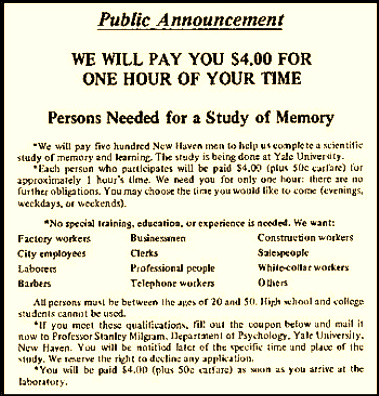I think you may be taking the easy way out: "These people somehow rationalized doing evil." There is compelling evidence that any one of us would have done the very same thing. Milgram's subjects, apparently typical people, voluntarily agreed to take part in a one-time experiment. They must have known that they were free to walk out at any time, and the worst consequence they would face would be the loss of four dollars. They had no relationship to the experimenter. A camera recorded the scene, and one would expect that the results would be shared and published publicly. The subjects had good reason to believe that their actions were leading to the death of another human being, a regular person just like them who had also walked in off the street. Yet most were induced to continue merely by a man in a uniform intoning the words "the experiment requires that you continue." The subjects experienced considerable anguish, not unlike the CIA workers who were "profoundly affected" in August 2002. They had orders. Refusing to comply would likely affect their careers. They may have had reason to believe that they were saving lives by torturing a person. Torturing, yet not killing, a person who may have intended to harm and kill others. They were in hidden locations far from home, working for an organization known for keeping secrets, which discouraged them from talking about even their routine work with friends or family. I don't believe we have evolved enough in a half-century to imagine that any of us would have behaved more decently. We might ask "what the fuck is wrong with [most] humans," and we might also reflect on the consequences of appointing a subset of these same humans as institutionalized authority figures over others.